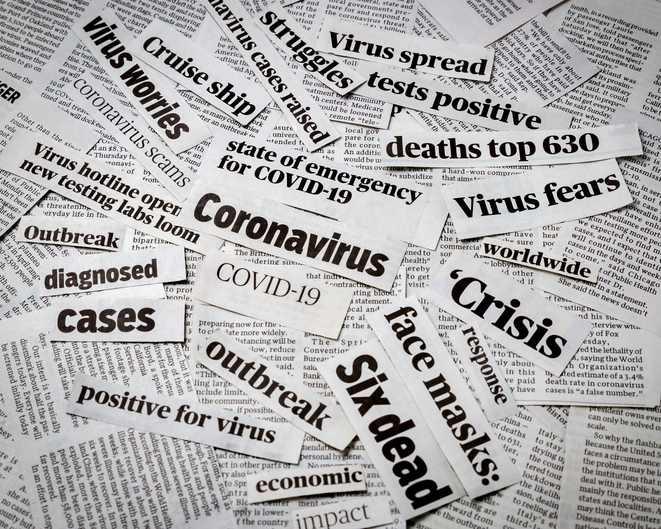
For some people, current events have led to the exacerbation of a condition known as “headline stress disorder”. Because of how quickly news gets disseminated and spread thanks to cellphones and social media, it’s easy for anyone to feel overwhelmed by news coverage (Dong & Zheng, 2020). In addition, because the media also plays a part in helping inform citizens of preventative measures to take to avoid contracting the coronavirus, for example, it’s hard not to want to keep up with the news, as much as it may act as a detriment to one’s behaviour or mental health (Dong & Zheng, 2020). What happens when excessive exposure to news coverage causes so much anxiety that coping becomes increasingly difficult? For this, a counselling therapist may be able to help.
The news cycle can be overwhelming for many people, even if this can be at odds with one’s desire to be informed of the happenings in the world (McMaster, 2020). However, a counselling therapist can use various strategies to help clients navigate these emotions, even if there are limits as to what they can do. Here’s an examination of what exactly headline stress disorder is, what its symptoms are, and what you can do as a counselling therapist to help clients experiencing it.
What Is Headline Stress Disorder, and How Does it Manifest Itself?
American psychologist Steven Stosny, PhD, birthed the term “headline stress disorder” in 2016, prior to the U.S. election won by Donald Trump (“News headlines getting you down? Here’s how to protect your mental health | CBC Radio”, 2019). His term had previously taken on the name “election stress disorder”, until Trump’s victory led to increased media coverage and feelings of extreme anxiety among the public (Ramsey, 2018). While the term “headline stress disorder” is not formally recognized as a medical diagnosis (Dong & Zheng, 2020), it is one that has garnered attention and recognition in recent times nonetheless.

Furthermore, those pursuing a counsellor therapist career should know that headline stress disorder may trigger a number of symptoms, such as insomnia, and can lead to mental health conditions such as depression and anxiety (Dong & Zheng, 2020). According to psychology professor Mary McNaughton-Cassill, PhD, our brains are “not made to process as much information as we’re getting now. We like to categorize, we like answers.” This is in addition to the fact that easy access to the Internet, and specifically social media, can increase our exposure to anxiety-inducing news (Ramsey, 2018).
Helping Clients Cope: What a Counselling Therapist Can Do
Although headline stress disorder can be a difficult condition for some to cope with, there are a multitude of strategies a counselling therapist can recommend. For one, you can suggest that clients budget certain amounts of time to read the news, in order to not be overwhelmed by it or consume themselves excessively with it (Dong & Zheng, 2020). More specifically, you can recommend they take breaks from their social media channels altogether (Ramsey, 2018). You can also emphasize to them the importance of journaling, and that writing their thoughts down on paper can be therapeutic when they’re feeling particularly anxious about the news cycle (“News headlines getting you down? Here’s how to protect your mental health | CBC Radio”, 2019). If clients are so inclined, you can encourage them to practice activism in order for them to help enact the change they want to see in the world. This can include attending demonstrations, supporting businesses run by marginalized populations, volunteering, or contacting local officials (Ramsey, 2018).

While clients may be tempted to ignore the news whenever possible, it can be detrimental to not be attentive at all to the news cycle. Thus, the client must take measures to avoid letting any feelings of hopelessness consume them (McMaster, 2020). With this in mind, it’s important to remind clients that they should think critically about any information they see online or on television, in case it is exaggerated, sensationalized, or factually inaccurate. You could also remind them to focus on what they can change rather than what they cannot (Dong & Zheng, 2020). Although these strategies won’t necessarily erase the client’s anxieties over the news, they can each play a certain role in helping keep their feelings of anxiety, despair, or powerlessness to a minimum.
Do you want to take counselling therapist courses?
Contact Rhodes Wellness college for more information!
Works Cited
Dong, M., & Zheng, J. (2020). Letter to the editor: Headline stress disorder caused by Netnews during the outbreak of COVID‐19. Health Expectations, 23(2), 259-260. doi:10.1111/hex.13055
McMaster, G. (2020, April 06). How to cope with headline stress. Retrieved from https://www.folio.ca/how-to-cope-with-headline-stress/
News headlines getting you down? Here’s how to protect your mental health | CBC Radio. (2019, September 20). Retrieved from https://www.cbc.ca/radio/tapestry/headlines-and-rejection-1.5291275/news-headlines-getting-you-down-here-s-how-to-protect-your-mental-health-1.5291287
Ramsey, N. (2018, July 30). Headline Stress Disorder: When Breaking News Is Bad for … Retrieved from https://www.healthline.com/health-news/headline-stress-disorder-when-breaking-news-is-bad-for-health
Stosny, S. (2017, March 04). Overcoming Headline Stress Disorder. Retrieved from https://www.psychologytoday.com/us/blog/anger-in-the-age-entitlement/201703/overcoming-headline-stress-disorder









